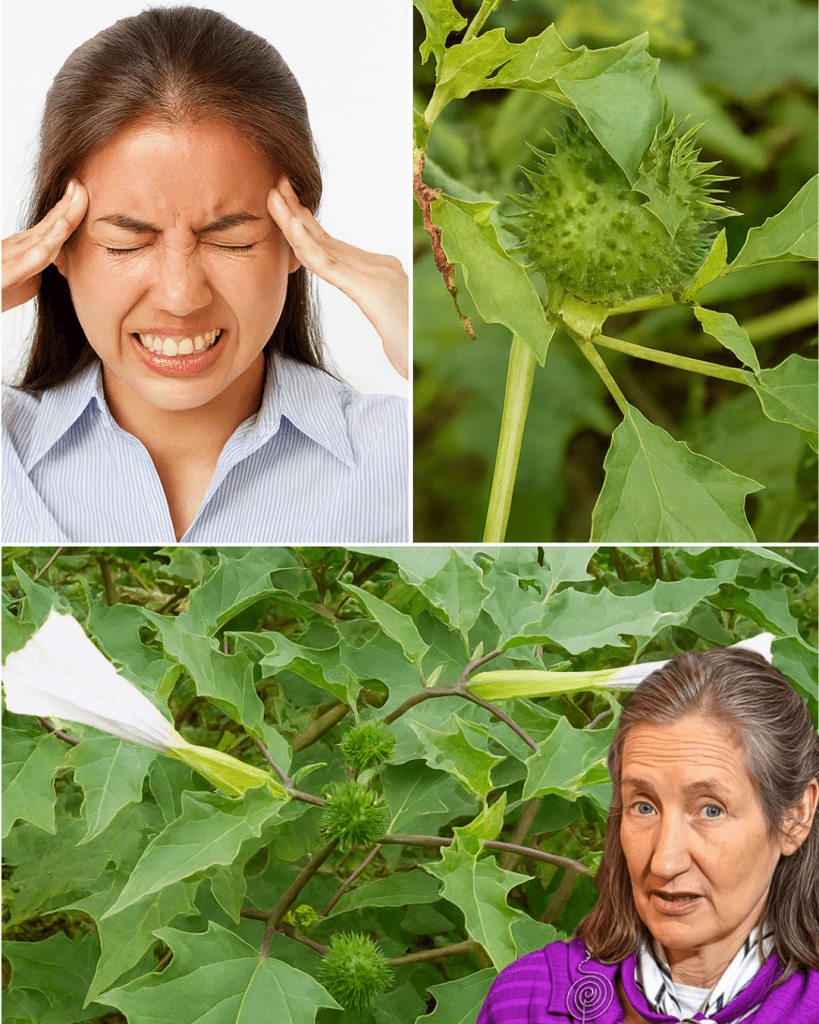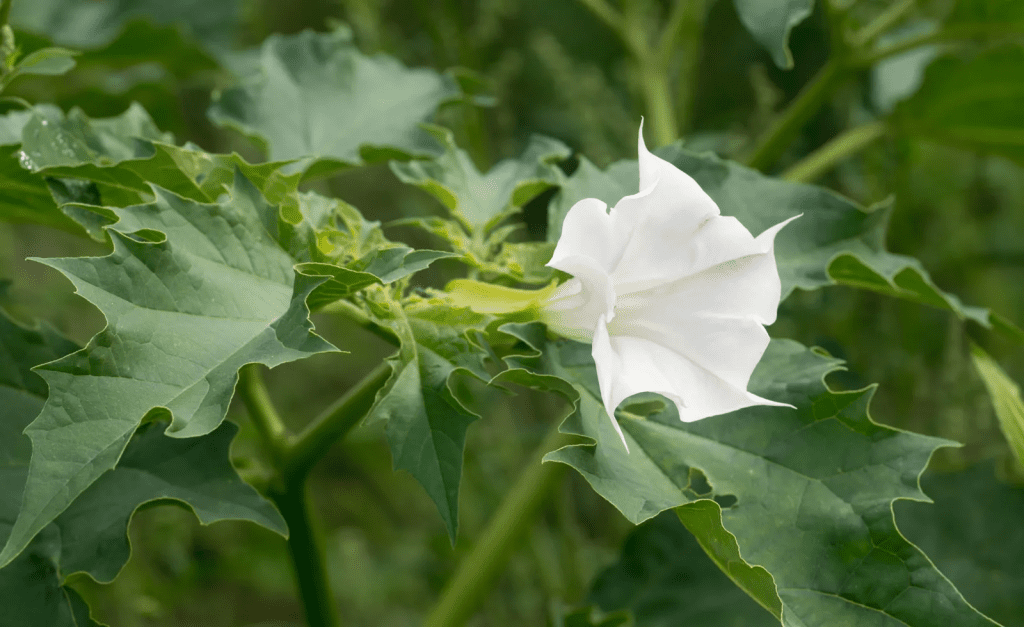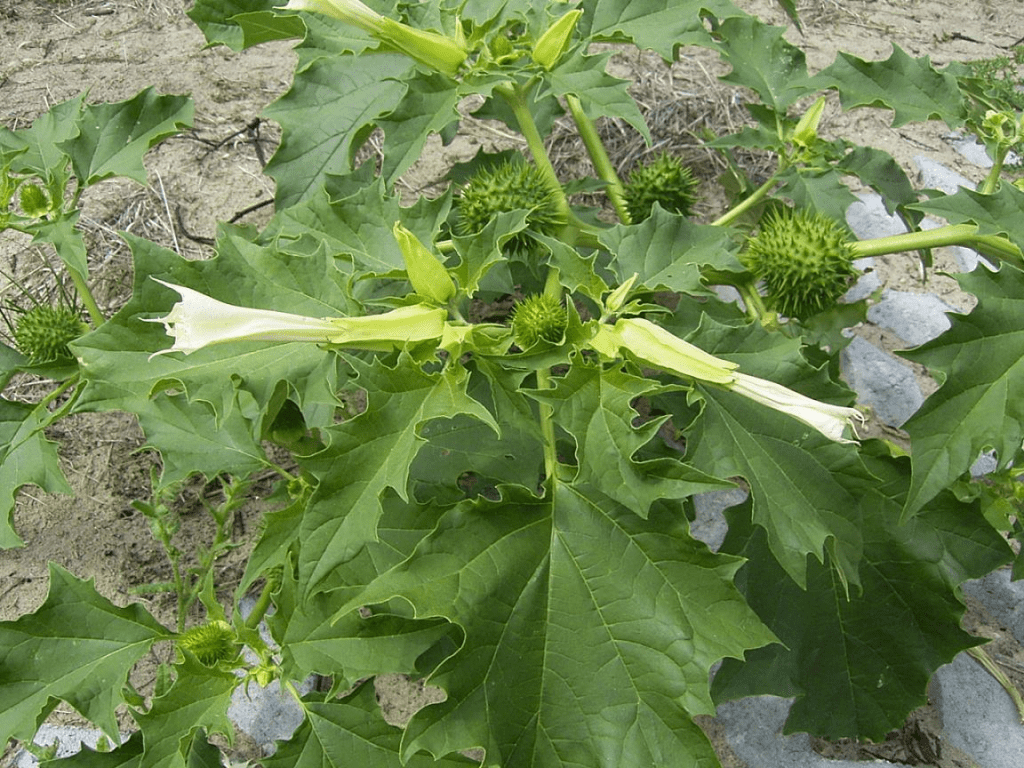Imagine a plant so powerful it can ease your pain, calm your spasms, or plunge you into a world of vivid hallucinations—yet one wrong move could cost you your life. Datura stramonium, known as Jimsonweed, Devil’s Trumpet, or Thorn Apple, is nature’s double-edged sword. This mysterious herb has captivated healers, shamans, and thrill-seekers for centuries, but its allure comes with a chilling warning: its potent alkaloids can turn medicine into poison in the blink of an eye. Ready to uncover the secrets of this fascinating yet dangerous plant? Let’s dive into everything you need to know about Datura stramonium—its benefits, its risks, and how to approach it with the respect it demands.

🌸 What Is Datura Stramonium?
Datura stramonium is no ordinary plant. Found in fields, roadsides, and abandoned lots across the globe, it’s as striking as it is dangerous. Its spiky seed pods, large trumpet-shaped flowers, and jagged leaves make it unmistakable. But what truly sets it apart are its psychoactive alkaloids—scopolamine, atropine, and hyoscyamine. These compounds give Datura its medicinal potential and its terrifying toxicity. One moment, it’s a remedy; the next, it’s a toxin that can overwhelm your nervous system. Understanding this plant is like walking a tightrope—knowledge and caution are your only safety nets.
💊 The Hidden Benefits of Datura Stramonium
For centuries, traditional healers have harnessed Datura’s power in controlled settings, unlocking benefits that modern medicine still finds intriguing. When used with precision, this plant offers remarkable properties, but every benefit comes with a caveat. Here are five ways Datura has been used historically—and why it demands respect.
🩹 Pain Relief Through Topical Application
🌬️ Respiratory Relief for Asthma and Beyond
In ancient healing systems like Ayurveda, Datura’s dried leaves were smoked or burned to open airways and ease asthma symptoms. The alkaloids relax bronchial muscles, offering temporary relief from respiratory distress. However, modern medicine warns against this practice. Inhaling Datura’s smoke can trigger severe side effects, from heart palpitations to hallucinations, making it a risky choice for lung support.
🛌 Antispasmodic Power for Muscle Relaxation
Datura’s ability to calm muscle spasms has made it a go-to in traditional medicine for conditions like gastrointestinal cramps, menstrual pain, and neuromuscular disorders. Its alkaloids act on the nervous system to ease involuntary muscle contractions. But precision is everything—too much Datura can tip the scales from relief to catastrophe, with overdose symptoms ranging from confusion to seizures.
😴 Sedative Effects for Restful Sleep
In minute doses, Datura has been used to promote relaxation and combat insomnia. Its alkaloids slow nervous system activity, creating a calming effect that can lull you into sleep. Yet, this is no gentle lullaby. Overuse can lead to disorientation, vivid hallucinations, or even a coma. Only those with expert knowledge should ever attempt to use Datura as a sleep aid.
🩺 Soothing Skin Irritations
Datura’s antibacterial and anti-inflammatory properties have made it a traditional remedy for minor wounds, burns, and skin irritations. Applied carefully to intact skin, it can reduce swelling and promote healing. But caution is non-negotiable—applying Datura to broken skin or large areas risks systemic absorption, turning a remedy into a poison.

⚠️ The Dark Side of Datura Stramonium
Datura’s beauty hides a sinister truth: it’s one of nature’s most toxic plants. Every part—seeds, leaves, flowers, and stems—contains alkaloids that can wreak havoc on the body and mind. The line between therapeutic and toxic is razor-thin, and crossing it can have devastating consequences. Here’s why Datura is as feared as it is revered.
☠️ Lethal Toxicity in Every Part
Datura’s alkaloids don’t discriminate. Even a small amount can trigger a cascade of symptoms: rapid heart rate, high fever, severe confusion, delirium, seizures, and, in extreme cases, death. Poisoning cases often stem from accidental ingestion or reckless experimentation, with symptoms appearing within minutes. This isn’t a plant to triflle with—its toxicity demands respect.
🌀 Unpredictable Hallucinogenic Effects
Datura’s psychoactive properties have lured thrill-seekers, but its hallucinations are no recreational joyride. Users report vivid, disorienting visions that can last hours or days, often accompanied by paranoia, agitation, and dangerous behavior. Unlike other psychedelics, Datura’s effects are erratic and uncontrollable, making it a perilous choice for those seeking a “high.”
📏 A Narrow Therapeutic Window
🚨 Risk of Addiction and Misuse
Some individuals are drawn to Datura’s hallucinogenic effects, ignoring its dangers. Recreational use is a recipe for disaster, with overdoses leading to hospitalization, mental health crises, or worse. The plant’s allure can foster dangerous patterns of misuse, especially among those unaware of its potency.
🧑⚕️ Unsafe Without Expert Knowledge
Unlike gentler herbs like chamomile or peppermint, Datura is not for the untrained. Its preparation and dosing require specialized knowledge to avoid catastrophic side effects. Without the guidance of a qualified herbalist or healthcare provider, using Datura is like playing Russian roulette with your health.

🛡️ How to Approach Datura Safely (If At All)
If you’re intrigued by Datura’s potential, proceed with extreme caution. This plant is not a casual remedy—it demands respect, knowledge, and professional oversight. Here are essential guidelines to keep you safe.
🚫 Avoid Internal Consumption
Ingesting Datura is a high-stakes gamble. The risk of poisoning is so severe that even traditional healers rarely recommend it. Symptoms of overdose can escalate rapidly, leaving little time for intervention. Stick to safer alternatives for internal use.
🧴 Topical Use with Expert Supervision
For pain relief, Datura may be applied topically in small, controlled amounts—but only under the guidance of a professional. Ensure the skin is intact to prevent absorption, and never experiment without expert advice.
🧒 Keep Out of Reach of Children and Pets
Datura’s toxicity makes it a hazard for households with children or pets. A single seed or leaf can be fatal if ingested. Store any Datura products securely and far from curious hands or paws.
🚭 Steer Clear of Recreational Use
The allure of Datura’s hallucinations is a trap. Its unpredictable effects can lead to dangerous behavior, mental distress, or life-threatening overdose. There are safer ways to explore altered states of consciousness—Datura is not worth the risk.
🩺 Consult a Professional
🌟 Final Thoughts: Is Datura Worth the Risk?
Datura stramonium is a paradox—a plant with profound medicinal potential and equally profound dangers. Its history in traditional medicine is undeniable, offering relief for pain, spasms, and skin issues when used with meticulous care. Yet, its toxicity, unpredictability, and narrow therapeutic range make it a perilous choice for all but the most experienced practitioners.
For the average person, Datura’s risks far outweigh its benefits. Safer alternatives exist for pain relief, respiratory support, and sleep issues, without the threat of poisoning or hallucinations. If you’re drawn to its mystique, let curiosity lead you to knowledge, not experimentation. Always consult a professional before considering its use, and never underestimate the power of this enigmatic herb.
Have you ever encountered Datura in the wild or heard stories of its use? Its dual nature as both healer and poison makes it a captivating subject. Share this guide to spark conversations about the wonders and warnings of Datura stramonium. Stay curious, stay informed, and above all, stay safe.
